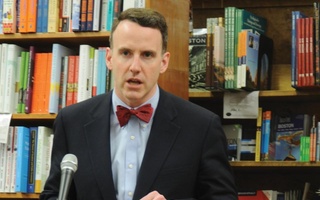For many students, the thought of going to section as opposed to enjoying the increasingly warm weather is enough to make them cringe. The prospect of attending a section in which the Teaching Fellow has an accent so pronounced that it is challenging to understand even the simplest phrases is even more unappealing. Even when the problem is not the language itself, many foreign TFs have trouble understanding things like extracurricular commitments and why students occasionally eat in class.
It is unfortunate that students have to worry about communication barriers when they are already struggling to learn and understand the course material. This problem has become a growing issue at Harvard and seems to especially affect students taking courses in math and the sciences, where classes are often large and English is not necessarily internal to the subject matter. In an attempt to remedy this problem, the Derek Bok Center for Teaching and Learning launched a pilot class in which TFs who are not native English speakers could learn skills to break the cultural and communication barriers in the classroom and, after its initial success, extended the program past its pilot period. Though this is a step in the right direction, Harvard should take further action to ensure that all TFs are proficient in written and spoken English language and American culture.
Undoubtedly, each employed TF has many years of expertise in his or her field and has much to offer Harvard students. It is thus extremely unfortunate that both the students’ and the TF’s classroom experiences are marred simply by a lack of communication. Though we often complain about what a frustrating experience this can be for students, the inability to communicate is often equally frustrating for the TF. The program at the Bok Center helps TFs develop oral communication skills and recognizes that communication barriers do not necessarily stem from a lack of understanding English. In fact, the course offered does not hone skills in English grammar, but rather teaches foreign TFs about American culture in hopes of tearing down some of the cultural barriers and thus making communication easier. Though the program is promising, it is also extremely limited—only 16 out of 40 foreign TFs who applied for the class were accepted. More needs to be done to ensure that all TFs are able to effectively communicate with their students.
Harvard already tests all future TFs for proficiency in English. Now, however, those who do not meet the standards should be mandated to enroll in an English culture and language class. Many foreign TFs are probably aware of the communication barrier between students and themselves, and participation in such training would be a way to proactively overcome certain qualms about teaching in an unfamiliar language.
An English proficiency requirement might leave some departments lacking TFs, but there should be a stream of potential TFs who are willing to take the course as a prerequisite to their teaching positions, thus lessening the chances of a TF shortage. Perhaps previous graduate students who were discouraged by the prospect of teaching a class without a solid grasp of the English language and American culture would be more likely to apply to be a TF, knowing they would receive support and training from such a class.
These procedures are by no means a judgment of the value of a non-native, English-speaking TF in the classroom. In fact, we are extremely fortunate to have these TFs contributing to our education. They are simply thwarted by a communication problem for which there is a potential remedy. If measures are implemented to ensure all TFs have a thorough understanding of how to teach American students before entering the classroom, there will be more learned and less lost in translation.
Read more in Opinion
Deus Ex VulcanRecommended Articles
-
 University Library Director Delves Into French Poetry
University Library Director Delves Into French Poetry -
 Glaeser Presents New Book on Cities
Glaeser Presents New Book on Cities -
Let’s TalkThe Undergraduate Council, one visible channel for affecting change, is perpetually under fire for alleged irrelevance and inability to meaningfully improve the Harvard student’s experience. In light of the stagnant relationship between students and the administration, the UC, led by President Senan Ebrahim, have proposed the Harvard University Forum for Change.
-
Technology and DecisionsRead Receipts reflect society’s movement away from traditional methods of long-distance communication and toward a more realistic model of in-person communication.
-
Students Criticize University Response to Marathon Explosions, Cambridge Bomb ThreatsIn the wake of two bomb explosions that killed three people and injured more than 130 others, Harvard students criticized what they described as the University’s slow communication with undergraduates.
-
Students Criticize Administrators' Response to Marathon BombingsStudent leaders criticized what some have characterized as a dangerously delayed communication from the University following Monday’s bombing at the Boston Marathon during the monthly meeting of the Harvard College Safety Committee Thursday.













